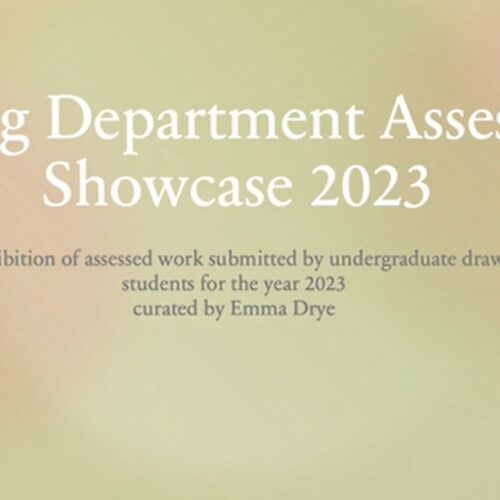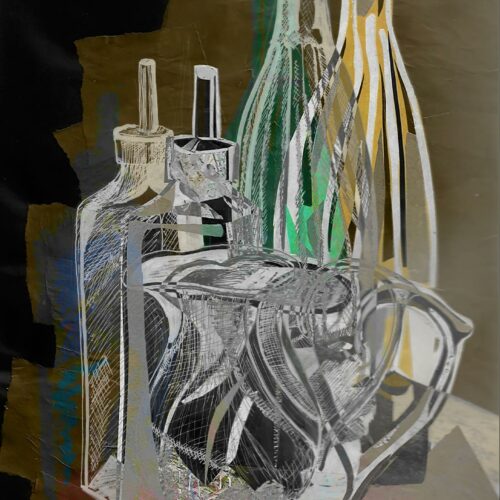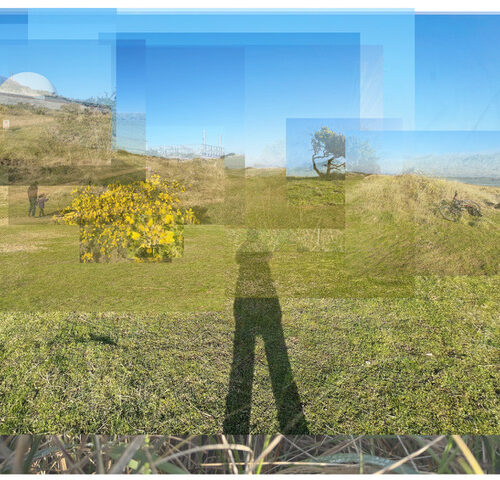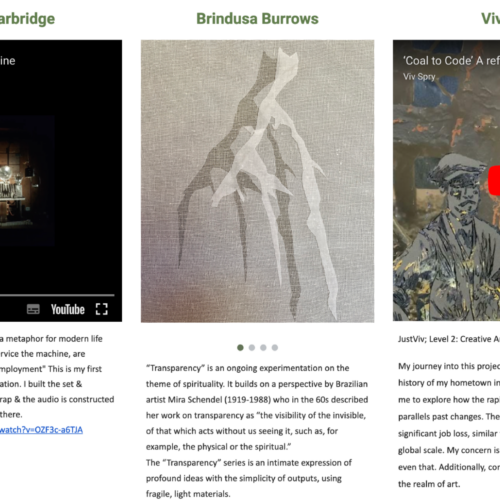
In conversation with: Dorothy Flint

Tell us a little bit about yourself.
I was born in 1925 in Lancashire, and then moved to Northamptonshire aged six. I went to two boarding schools in the 1930s/40s. Later I trained as a nurse at London Hospital, Whitechapel, from 44 to 48, I competed my midwifery training in Dublin, then worked in London. In 1953 I joined Queen Alexandras royal ArmyNursing Corps. Later I worked in retail management and as pharmaceutical representative. I retired 1958. my interests are art, gardening, books – collecting antiquarian books, mainly children’s and illustrated.
What sort of Art experience did you have prior to OCA?
I had good teaching at first school and then did exams at the Royal Drawing Society. (I have three lovely art-nouveau-ish certificates) I had a very good lesson on linear perspective which I have never forgotten.
Senior school teaching was craft based until a qualified teacher arrived when I was in 6th form, and introduced colour reproductions of Impressionist paintings—Wow! Until then it was all in monochrome. There were no gallery visits, it was wartime, so no exhibitions on loan. When I went to London to train, I discovered the galleries and colour at last, aged19.
I have drawn as long as I can remember, and throughout working life made various attempts to get tuition which all failed. So in retirement I started going to classes and still do. Also I started keeping sketchbooks which is now a habit.
I belong to a thriving art club, founded in 1904 by a friend of Degas, and I exhibit and often sell with them.
I have always been fascinated by Illustration, including black and white work, and have many illustrated books from 1700s to present day.
Describe your creative process.
Ideas may come from anywhere, and I try to do a rough sketch on whatever is to hand. Then this gets explored through more sketches, thumbnails, spider diagrams in my sketchbooks. I research of how artists have interpreted similar things, or items I need for my drawing or to get further ideas. Sometimes a happy accident like spilt ink can give another approach. Experiments with media and tools, sizes and formats, repeated revision, simplifying, refining, and much despair.
Is Process of making as important as finished piece?
Yes, I often worry about the finished piece though I have enjoyed the process, and sometimes feel happier leaving it in a fairly rough state.
I was fortunate enough to contribute to your sketchbook and have you contribute to mine during our sketchbook circle, have you any tips for students on keeping sketchbooks. Are they something you’ve always kept and carry with you?
Have them everywhere. I usually have five on the go, one to supplement my log book, one in my handbag for “quickies”, one to carry around at home or out, one near the t.v.and one kept for research and copying.
Don’t feel hesitant about drawing in public, very few people notice, and most of those who do are really interested.
When sketching people and animals I try to get movement down quickly, however badly, and don’t rub out mistakes.
Keep it simple and just try, a few marks can be inspirational and bring back memories, like drawing at the circus.
Interruptions are worst. Phone calls, unexpected visitors, however welcome, delay in getting idea on paper and you lose it, health issues, feeling inadequate, rules about “how to….;”
and preconceptions.
What are your favourite art making media?
Pencil or pen, with or without colour washes.
How have you found studying with the OCA?
I accidentally got involved. Saw an advert for a new Illustration course and signed up. It was some time before I realised I was on a degree course, and by then was hooked. ( degree is a fantasy but a necessary stimulus!)
It is a great experience. I have learned so much in gradual stages which I can cope with.
The support and understanding are excellent, both from tutors and head office.
I feel so lucky to have found this at my mature years, and not to be told I am too old.
This is supplemented by other students, on line or on study days.
Any advice for new students?
Look forward to your studies and don’t feel nervous. The support is there as I have described. Use the forums and join in. above all enjoy it
What is your favourite piece of art, yours or someone else’s?
An impossible question! This has changed over the years as I learn about more artists and get to galleries. Rembrandt portraits and his sketches, anything by Elizabeth Frink, Degas drawings,Illustrators Charles Keeping, and Peter Reddick, Kokoscha are just a few.


“I had the pleasure of working with Dorothy while she undertook the level 1 visual communication courses in Illustration and Book Design. I wasn’t too sure when her first assignment arrived. Double mounted work, frenetic sketchbooks and handwritten notes took a while to tune into. But by the time I posted the box back to Devon, I could see the potential. As as a student, I found her enthusiasm for drawing, commitment to using sketchbooks and wanting to expand her learning was fantastic. We wrote a WeAreBlog post together in 2014, talking about the dynamic of her drawing and her relationship with sketching. Her drawing continues today and it’s just as energetic and vital, capturing everyday situations and casual interactions.
Dorothy has also popped along to a number of study visits over the years, travelling considerable distances on the MegaBus to join in. As a person, I found her incredibly warm and generous, making connections with fellow students and encouraging others in their work. Over the years I have worked with thousands of art students, and I have to say that Dorothy enjoys being an art student much more than most. And enjoyment is the key to learning in my book.”
OCA tutor and programme leader Christian Lloyd
“What is a joy about Dorothy is the clear sense of energy evident within her work. It exudes a sense of sheer pleasure in looking at the word and making a personal visual response to it. We have talked about the notion of visual language and creative identity and although Dorothy is keen to explore new media and approaches, resulting in some very competent and considered drawing pieces, there is a distinct personality that permeates her sketchbook work in particular; it is dynamic and searching and alive. As a tutor I have been lucky to have learned from my students and Dorothy reminds me that drawing is a wonderful , enriching thing and I am grateful to be her tutor.”
OCA tutor Jo Davies
With thanks to Dorothy, Christian and Jo.







Heart warming and so right. Great to have the work featured.
I have been lucky to share work with Dorothy via the sketchbook circle and I agree with everything above. She is inspirational
You really are an inspiration for me Dorothy with your enthusiasm and lovely work.
I was delighted and inspired by meeting Dorothy at a Richard Long study visit in Bristol. Lively, lovely and welcoming she is a terrific ambassador for the OCA and it is great to see her profiled here.
Glad to hear news of you Dorothy … all the best Amano
Fabulous Dorothy. I remember the blog post from a couple of years ago and your sketchbooks were an inspiration then and they continue to be!
I loved reading this. Inspiring work and work ethic.
Great inspiration, I feel a unique zest for learning and for life permeating this post! thanks for sharing this and making my afternoon full of smiles.
Dorothy, you certainly are inspiring with your work ethic and your fascinating work. I’m glad to see your work featured.
Thank you all for your lovely comments, so reassuring. I am so lucky to have this experience and have so much encouragement.
P.S. Retired in 1978 not 58!